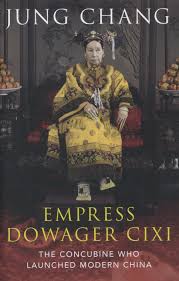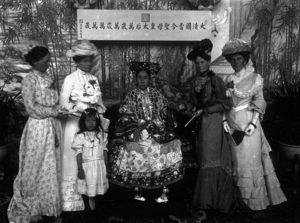 How history changes! At school I learned that nineteenth century China was easy-pickings for European powers who were able to easily kick aside her antiquated army and carve out for themselves “spheres of influence” for their own trading benefits as they willed. The most scandalous of these occasions were the Opium Wars in which Britain forced the Chinese imperial government to open up the Chinese populace to British merchants making a “killing” selling Indian opium.
How history changes! At school I learned that nineteenth century China was easy-pickings for European powers who were able to easily kick aside her antiquated army and carve out for themselves “spheres of influence” for their own trading benefits as they willed. The most scandalous of these occasions were the Opium Wars in which Britain forced the Chinese imperial government to open up the Chinese populace to British merchants making a “killing” selling Indian opium.
Two reasons were always given for the ease with which Westerners were able to dominate China so easily:
- The Chinese felt so superior to the West, disdaining the “barbarians”, that they had no wish to learn from them or adopt any of their ways, not even their superior technology;
- The Chinese from the later nineteenth to the early twentieth century was effectively ruled by a Dowager Empress who was authoritarian yet weak and loathed Westerners and resisted any form of modernization.
Maybe those points need to be nuanced but that’s essentially how I recall my high school lessons of China before the Republican movement, the Japanese invasion and the Communist Revolution.
One thing always stood out: the Empress Dowager was bad news for China.
All that has been completely turned on its head since a new book by Jung Chang, Empress Dowager Cixi: The Concubine Who Launched Modern China. The author writes with the benefit of documents released for the first time from Chinese and Japanese archives.
It turns out that far from being the brake on modernizing China the Empress Dowager was in fact the driving force behind modernization. At the time of her death she was even working towards establishing a Constitutional Monarchy that would have given millions of Chinese the right to vote. So much that I learned about pre-communist and pre-republican China has been completely turned on its head.
Among the reforms she was responsible for:
- the end of foot-binding of women and promotion of women’s liberation
- introduction of Western style education systems and curricula
- the modernization of the methods and equipment of the army and navy
- protection and justice for Westerners against anti-Western violence
- establishment of cordial diplomatic relations with Western powers, in particular with America
- curbing Western and Japanese encroachments on Chinese territory and eventual banning of some of the cruelest traditional punishments
- a free press (probably freer than at any time since in China’s history — even though many newspapers criticized her severely)
- railways
- electricity
- telegraph
- telephone
- western methods of public administration
Not all of these were carried out perfectly. She was hampered by the realities and tensions of having to rule through young emperors — first her own son and then through an adopted son — who were widely regarded as unsuitable heads of state. The latter was also susceptible to being manipulated by court — in particular pro-Japanese — intrigues. There were times when she had to retire to the seclusion of the harem and let younger heads be led by less wise advisers who did let their hatred of the Westerners cloud their judgments.
The most serious mistake of her career was succumbing to pressure to support the Boxers in their efforts to drive out the Westerners. Significantly she acknowledged this mistake and soon returned China to its march towards modernization and diplomatic relations with other world powers.
Some interesting details along the way:
- She was slow to introduce the railway for fear that it would disturb the spirits of the dead — rail lines would have to be built close to so many family tombs.
- She enjoyed riding a tricycle given her as a gift but never rode in the car that was also given her. The reason: the chauffeur would be required to sit in front of her and that violated the fundamentals of court etiquette.
- It was “natural” for the empress to have a love affair with a court eunuch.
- It was impossible for anyone, even a western artist, to paint the most realistic portrait of Cixi from a live sitting since to capture character and depth shadow is required, yet Chinese tradition did not allow any shadow since it indicated/suggested a “dark side” of a character.
- On her death bed she had her son murdered for fear that if he survived her he would hand China over to the Japanese; she also ordered that the ultimate authority be another dowager empress, but one who was eminently weak and yielding in manner, who was always retiring and self-effacing. The reason? If stronger-willed persons were left in charge they would fight to protect the monarchy against the republican movement with much loss of life. The new empress dowager yielded to the republican demands and allowed for a peaceful transition. She thus avoided a civil war and an inevitable massacre of the Manchu Chinese. (Her dynasty was Manchu.)
The final paragraphs of the book:
The past hundred years have been most unfair to Cixi, who has been deemed either tyrannical and vicious or hopelessly incompetent — or both. Few of her achievements have been recognized and, when they are, the credit is invariably given to the men serving her. This is largely due to a basic handicap: that she was a woman and could only rule in the name of her sons — so her precise role has been little known. In the absence of clear knowledge, rumours have abounded and lies have been invented and believed. As Pearl Buck observed, those who hated her were simply ‘more articulate than those who loved her’. The political forces that have dominated China since soon after her death have also deliberately reviled her and blacked out her accomplishments — in order to claim that they have saved the country from the mess she left behind.
In terms of groundbreaking achievements, political sincerity and personal courage, Empress Dowager Cixi set a standard that has barely been matched. She brought in modernity to replace decrepitude, poverty, savagery and absolute power, and she introduced hitherto untasted humaneness, open-mindedness and freedom. And she had a conscience. Looking back over the many horrific decades after Cixi’s demise, one cannot but admire this amazing stateswoman, flawed though she was.

Hear also a podcast interview with the author: Empress Cixi – the concubine who launched modern China
If you enjoyed this post, please consider donating to Vridar. Thanks!

I bought my wife that book for Christmas. I’m looking forward to reading it when she’s done.
Good choice. I have ordered Jung Chang’s earlier book on Mao. Will be interesting to see what research has uncovered since those radical years of the 1960s when his picture and “little red book” were so freely available and widely read.
Jesus’ brother caused additional complications during the early part of her rule.
This is a reference to Hong Xuiquan who claimed to be the Brother of Jesus and led the Taiping peasant rebellion, setting up the “Heavenly Kingdom” across much of China.
What’s the matter, Neil? You can’t even allow a comment stating that the major “British” opium trader was in fact a Sephardic Jew?
You’re such a cowardly geriatric leftist.
Better to be a cowardly geriatric leftist than an anti-semite. The British parliamentary majority that voted for the war and all those who led and joined the fight and and all traders were Jews, of course, weren’t they. And there wasn’t a single Jew among the very widespread British public opposition to the War, either, no doubt?
Anti-semites are banned here. I’ll show your way out to the spam bin.
Locked, but really you should be a subscriber to the NY Review of Books. http://www.nybooks.com/articles/archives/2013/dec/05/surprising-empress/